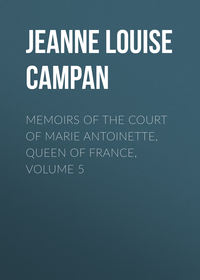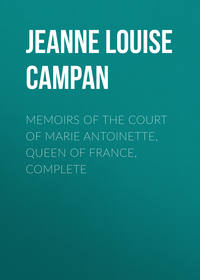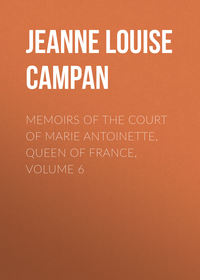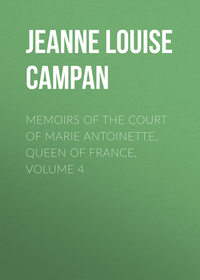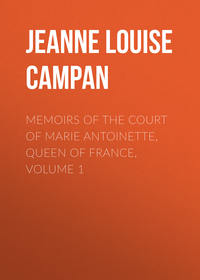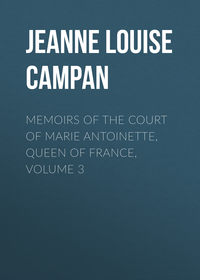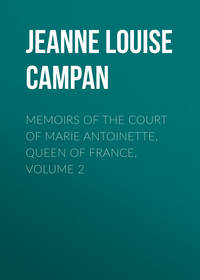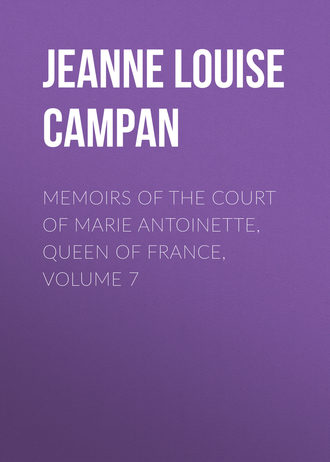 полная версия
полная версияMemoirs of the Court of Marie Antoinette, Queen of France, Volume 7
The infamous wretch exhibited her head to the people, as he was accustomed to do when he had sacrificed an illustrious victim.
The Last Separation.—Execution of Madame Elisabeth.
–Death of the Dauphin.
The two Princesses left in the Temple were now almost inconsolable; they spent days and nights in tears, whose only alleviation was that they were shed together. "The company of my aunt, whom I loved so tenderly," said Madame Royale, "was a great comfort to me. But alas! all that I loved was perishing around me, and I was soon to lose her also . . . . In the beginning of September I had an illness caused solely by my anxiety about my mother; I never heard a drum beat that I did not expect another 3d of September."—[when the head of the Princesse de Lamballe was carried to the Temple.]
In the course of the month the rigour of their captivity was much increased. The Commune ordered that they should only have one room; that Tison (who had done the heaviest of the household work for them, and since the kindness they showed to his insane wife had occasionally given them tidings of the Dauphin) should be imprisoned in the turret; that they should be supplied with only the barest necessaries; and that no one should enter their room save to carry water and firewood. Their quantity of firing was reduced, and they were not allowed candles. They were also forbidden to go on the leads, and their large sheets were taken away, "lest—notwithstanding the gratings!—they should escape from the windows."
On 8th October, 1793, Madame Royale was ordered to go downstairs, that she might be interrogated by some municipal officers. "My aunt, who was greatly affected, would have followed, but they stopped her. She asked whether I should be permitted to come up again; Chaumette assured her that I should. 'You may trust,' said he, 'the word of an honest republican. She shall return.' I soon found myself in my brother's room, whom I embraced tenderly; but we were torn asunder, and I was obliged to go into another room.—[This was the last time the brother and sister met] . . . Chaumette then questioned me about a thousand shocking things of which they accused my mother and aunt; I was so indignant at hearing such horrors that, terrified as I was, I could not help exclaiming that they were infamous falsehoods.
"But in spite of my tears they still pressed their questions. There were some things which I did not comprehend, but of which I understood enough to make me weep with indignation and horror . . . . They then asked me about Varennes, and other things. I answered as well as I could without implicating anybody. I had always heard my parents say that it were better to die than to implicate anybody." When the examination was over the Princess begged to be allowed to join her mother, but Chaumette said he could not obtain permission for her to do so. She was then cautioned to say nothing about her examination to her aunt, who was next to appear before them. Madame Elisabeth, her niece declares, "replied with still more contempt to their shocking questions."
The only intimation of the Queen's fate which her daughter and her sister-in-law were allowed to receive was through hearing her sentence cried by the newsman. But "we could not persuade ourselves that she was dead," writes Madame Royale. "A hope, so natural to the unfortunate, persuaded us that she must have been saved. For eighteen months I remained in this cruel suspense. We learnt also by the cries of the newsman the death of the Duc d'Orleans.
[The Duc d'Orleans, the early and interested propagator of the Revolution, was its next victim. Billaud Varennes said in the Convention: "The time has come when all the conspirators should be known and struck. I demand that we no longer pass over in silence a man whom we seem to have forgotten, despite the numerous facts against him. I demand that D'ORLEANS be sent to the Revolutionary Tribunal." The Convention, once his hireling adulators, unanimously supported the proposal. In vain he alleged his having been accessory to the disorders of 5th October, his support of the revolt on 10th August, 1792, his vote against the King on 17th January, 1793. His condemnation was pronounced. He then asked only for a delay of twenty-four hours, and had a repast carefully prepared, on which he feasted with avidity. When led out for execution he gazed with a smile on the Palais Royal, the scene of his former orgies. He was detained for a quarter of an hour before that palace by the order of Robespierre, who had asked his daughter's hand, and promised in return to excite a tumult in which the Duke's life should be saved. Depraved though he was, he would not consent to such a sacrifice, and he met his fate with stoical fortitude.—ALLISON, vol. iii., p. 172.]
It was the only piece of news that reached us during the whole winter."
The severity with which the prisoners were treated was carried into every detail of their life. The officers who guarded them took away their chessmen and cards because some of them were named kings and queens, and all the books with coats of arms on them; they refused to get ointment for a gathering on Madame Elisabeth's arm; they, would not allow her to make a herb-tea which she thought would strengthen her niece; they declined to supply fish or eggs on fast-days or during Lent, bringing only coarse fat meat, and brutally replying to all remonstances, "None but fools believe in that stuff nowadays." Madame Elisabeth never made the officials another request, but reserved some of the bread and cafe-au-lait from her breakfast for her second meal. The time during which she could be thus tormented was growing short.
On 9th May, 1794, as the Princesses were going to bed, the outside bolts of the door were unfastened and a loud knocking was heard. "When my aunt was dressed," says Madame Royale, "she opened the door, and they said to her, 'Citoyenne, come down.'—'And my niece?'—'We shall take care of her afterwards.' She embraced me, and to calm my agitation promised to return. 'No, citoyenne,' said the men, 'bring your bonnet; you shall not return.' They overwhelmed her with abuse, but she bore it patiently, embracing me, and exhorting me to trust in Heaven, and never to forget the last commands of my father and mother."
Madame Elisabeth was then taken to the Conciergerie, where she was interrogated by the vice-president at midnight, and then allowed to take some hours rest on the bed on which Marie Antoinette had slept for the last time. In the morning she was brought before the tribunal, with twenty-four other prisoners, of varying ages and both sexes, some of whom had once been frequently seen at Court.
"Of what has Elisabeth to complain?" Fouquier-Tinville satirically asked. "At the foot of the guillotine, surrounded by faithful nobility, she may imagine herself again at Versailles."
"You call my brother a tyrant," the Princess replied to her accuser; "if he had been what you say, you would not be where you are, nor I before you!"
She was sentenced to death, and showed neither surprise nor grief. "I am ready to die," she said, "happy in the prospect of rejoining in a better world those whom I loved on earth."
On being taken to the room where those condemned to suffer at the same time as herself were assembled, she spoke to them with so much piety and resignation that they were encouraged by her example to show calmness and courage like her own. The women, on leaving the cart, begged to embrace her, and she said some words of comfort to each in turn as they mounted the scaffold, which she was not allowed to ascend till all her companions had been executed before her eyes.
[Madame Elisabeth was one of those rare personages only seen at distant intervals during the course of ages; she set an example of steadfast piety in the palace of kings, she lived amid her family the favourite of all and the admiration of the world …. When I went to Versailles Madame Elisabeth was twenty-two years of age. Her plump figure and pretty pink colour must have attracted notice, and her air of calmness and contentment even more than her beauty. She was fond of billiards, and her elegance and courage in riding were remarkable. But she never allowed these amusements to interfere with her religious observances. At that time her wish to take the veil at St. Cyr was much talked of, but the King was too fond of his sister to endure the separation. There were also rumours of a marriage between Madame Elisabeth and the Emperor Joseph. The Queen was sincerely attached to her brother, and loved her sister-in-law most tenderly; she ardently desired this marriage as a means of raising the Princess to one of the first thrones in Europe, and as a possible means of turning the Emperor from his innovations. She had been very carefully educated, had talent in music and painting, spoke Italian and a little Latin, and understood mathematics…. Her last moments were worthy of her courage and virtue.—D'HEZECQUES's "Recollections," pp. 72-75.]
"It is impossible to imagine my distress at finding myself separated from my aunt," says Madame Royale. "Since I had been able to appreciate her merits, I saw in her nothing but religion, gentleness, meekness, modesty, and a devoted attachment to her family; she sacrificed her life for them, since nothing could persuade her to leave the King and Queen. I never can be sufficiently grateful to her for her goodness to me, which ended only with her life. She looked on me as her child, and I honoured and loved her as a second mother. I was thought to be very like her in countenance, and I feel conscious that I have something of her character. Would to God I might imitate her virtues, and hope that I may hereafter deserve to meet her, as well as my dear parents, in the bosom of our Creator, where I cannot doubt that they enjoy the reward of their virtuous lives and meritorious deaths."
Madame Royale vainly begged to be allowed to rejoin her mother or her aunt, or at least to know their fate. The municipal officers would tell her nothing, and rudely refused her request to have a woman placed with her. "I asked nothing but what seemed indispensable, though it was often harshly refused," she says. "But I at least could keep myself clean. I had soap and water, and carefully swept out my room every day. I had no light, but in the long days I did not feel this privation much . . . . I had some religious works and travels, which I had read over and over. I had also some knitting, 'qui m'ennuyait beaucoup'." Once, she believes, Robespierre visited her prison:
[It has been said that Robespierre vainly tried to obtain the hand of Mademoiselle d'Orleans. It was also rumoured that Madame Royale herself owed her life to his matrimonial ambition.]
"The officers showed him great respect; the people in the Tower did not know him, or at least would not tell me who he was. He stared insolently at me, glanced at my books, and, after joining the municipal officers in a search, retired."
[On another occasion "three men in scarfs," who entered the Princess's room, told her that they did not see why she should wish to be released, as she seemed very comfortable! "It is dreadful,' I replied, 'to be separated for more than a year from one's mother, without even hearing what has become of her or of my aunt.'—'You are not ill?'—'No, monsieur, but the cruellest illness is that of the heart'—' We can do nothing for you. Be patient, and submit to the justice and goodness of the French people: I had nothing more to say."—DUCHESSE D'ANGOULEME, "Royal Memoirs," p. 273.]
When Laurent was appointed by the Convention to the charge of the young prisoners, Madame Royale was treated with more consideration. "He was always courteous," she says; he restored her tinderbox, gave her fresh books, and allowed her candles and as much firewood as she wanted, "which pleased me greatly." This simple expression of relief gives a clearer idea of what the delicate girl must have suffered than a volume of complaints.
But however hard Madame Royale's lot might be, that of the Dauphin was infinitely harder. Though only eight years old when he entered the Temple, he was by nature and education extremely precocious; "his memory retained everything, and his sensitiveness comprehended everything." His features "recalled the somewhat effeminate look of Louis XV., and the Austrian hauteur of Maria Theresa; his blue eyes, aquiline nose, elevated nostrils, well-defined mouth, pouting lips, chestnut hair parted in the middle and falling in thick curls on his shoulders, resembled his mother before her years of tears and torture. All the beauty of his race, by both descents, seemed to reappear in him."—[Lamartine]—For some time the care of his parents preserved his health and cheerfulness even in the Temple; but his constitution was weakened by the fever recorded by his sister, and his gaolers were determined that he should never regain strength.
"What does the Convention intend to do with him?" asked Simon, when the innocent victim was placed in his clutches. "Transport him?"
"No."
"Kill him?"
"No."
"Poison him?"
"No."
"What, then?"
"Why, get rid of him."
For such a purpose they could not have chosen their instruments better. "Simon and his wife, cut off all those fair locks that had been his youthful glory and his mother's pride. This worthy pair stripped him of the mourning he wore for his father; and as they did so, they called it 'playing at the game of the spoiled king.' They alternately induced him to commit excesses, and then half starved him. They beat him mercilessly; nor was the treatment by night less brutal than that by day. As soon as the weary boy had sunk into his first profound sleep, they would loudly call him by name, 'Capet! Capet!' Startled, nervous, bathed in perspiration, or sometimes trembling with cold, he would spring up, rush through the dark, and present himself at Simon's bedside, murmuring, tremblingly, 'I am here, citizen.'—'Come nearer; let me feel you.' He would approach the bed as he was ordered, although he knew the treatment that awaited him. Simon would buffet him on the head, or kick him away, adding the remark, 'Get to bed again, wolfs cub; I only wanted to know that you were safe.' On one of these occasions, when the child had fallen half stunned upon his own miserable couch, and lay there groaning and faint with pain, Simon roared out with a laugh, 'Suppose you were king, Capet, what would you do to me?' The child thought of his father's dying words, and said, 'I would forgive you.'"—[THIERS]
The change in the young Prince's mode of life, and the cruelties and caprices to which he was subjected, soon made him fall ill, says his sister. "Simon forced him to eat to excess, and to drink large quantities of wine, which he detested . . . . He grew extremely fat without increasing in height or strength." His aunt and sister, deprived of the pleasure of tending him, had the pain of hearing his childish voice raised in the abominable songs his gaolers taught him. The brutality of Simon "depraved at once the body and soul of his pupil. He called him the young wolf of the Temple. He treated him as the young of wild animals are treated when taken from the mother and reduced to captivity,—at once intimidated by blows and enervated by taming. He punished for sensibility; he rewarded meanness; he encouraged vice; he made the child wait on him at table, sometimes striking him on the face with a knotted towel, sometimes raising the poker and threatening to strike him with it."
[Simon left the Temple to become a municipal officer. He was involved in the overthrow of Robespierre, and guillotined the day after him, 29th July, 1794.]
Yet when Simon was removed the poor young Prince's condition became even worse. His horrible loneliness induced an apathetic stupor to which any suffering would have been preferable. "He passed his days without any kind of occupation; they did not allow him light in the evening. His keepers never approached him but to give him food;" and on the rare occasions when they took him to the platform of the Tower, he was unable or unwilling to move about. When, in November, 1794, a commissary named Gomin arrived at the Temple, disposed to treat the little prisoner with kindness, it was too late. "He took extreme care of my brother," says Madame Royale. "For a long time the unhappy child had been shut up in darkness, and he was dying of fright. He was very grateful for the attentions of Gomin, and became much attached to him." But his physical condition was alarming, and, owing to Gomin's representations, a commission was instituted to examine him. "The commissioners appointed were Harmond, Mathieu, and Reverchon, who visited 'Louis Charles,' as he was now called, in the month of February, 1795. They found the young Prince seated at a square deal table, at which he was playing with some dirty cards, making card houses and the like,—the materials having been furnished him, probably, that they might figure in the report as evidences of indulgence. He did not look up from the table as the commissioners entered. He was in a slate-coloured dress, bareheaded; the room was reported as clean, the bed in good condition, the linen fresh; his clothes were also reported as new; but, in spite of all these assertions, it is well known that his bed had not been made for months, that he had not left his room, nor was permitted to leave it, for any purpose whatever, that it was consequently uninhabitable, and that he was covered with vermin and with sores. The swellings at his knees alone were sufficient to disable him from walking. One of the commissioners approached the young Prince respectfully. The latter did not raise his head. Harmond in a kind voice begged him to speak to them. The eyes of the boy remained fixed on the table before him. They told him of the kindly intentions of the Government, of their hopes that he would yet be happy, and their desire that he would speak unreservedly to the medical man that was to visit him. He seemed to listen with profound attention, but not a single word passed his lips. It was an heroic principle that impelled that poor young heart to maintain the silence of a mute in presence of these men. He remembered too well the days when three other commissaries waited on him, regaled him with pastry and wine, and obtained from him that hellish accusation against the mother that he loved. He had learnt by some means the import of the act, so far as it was an injury to his mother. He now dreaded seeing again three commissaries, hearing again kind words, and being treated again with fine promises. Dumb as death itself he sat before them, and remained motionless as stone, and as mute." [THIERS]
His disease now made rapid progress, and Gomin and Lasne, superintendents of the Temple, thinking it necessary to inform the Government of the melancholy condition of their prisoner, wrote on the register: "Little Capet is unwell." No notice was taken of this account, which was renewed next day in more urgent terms: "Little Capet is dangerously ill." Still there was no word from beyond the walls. "We must knock harder," said the keepers to each other, and they added, "It is feared he will not live," to the words "dangerously ill." At length, on Wednesday, 6th May, 1795, three days after the first report, the authorities appointed M. Desault to give the invalid the assistance of his art. After having written down his name on the register he was admitted to see the Prince. He made a long and very attentive examination of the unfortunate child, asked him many questions without being able to obtain an answer, and contented himself with prescribing a decoction of hops, to be taken by spoonfuls every half-hour, from six o'clock in the morning till eight in the evening. On the first day the Prince steadily refused to take it. In vain Gomin several times drank off a glass of the potion in his presence; his example proved as ineffectual as his words. Next day Lasne renewed his solicitations. "Monsieur knows very well that I desire nothing but the good of his health, and he distresses me deeply by thus refusing to take what might contribute to it. I entreat him as a favour not to give me this cause of grief." And as Lasne, while speaking, began to taste the potion in a glass, the child took what he offered him out of his hands. "You have, then, taken an oath that I should drink it," said he, firmly; "well, give it me, I will drink it." From that moment he conformed with docility to whatever was required of him, but the policy of the Commune had attained its object; help had been withheld till it was almost a mockery to supply it.
The Prince's weakness was excessive; his keepers could scarcely drag him to the, top of the Tower; walking hurt his tender feet, and at every step he stopped to press the arm of Lasne with both hands upon his breast. At last he suffered so much that it was no longer possible for him to walk, and his keeper carried him about, sometimes on the platform, and sometimes in the little tower, where the royal family had lived at first. But the slight improvement to his health occasioned by the change of air scarcely compensated for the pain which his fatigue gave him. On the battlement of the platform nearest the left turret, the rain had, by perseverance through ages, hollowed out a kind of basin. The water that fell remained there for several days; and as, during the spring of 1795, storms were of frequent occurrence, this little sheet of water was kept constantly supplied. Whenever the child was brought out upon the platform, he saw a little troop of sparrows, which used to come to drink and bathe in this reservoir. At first they flew away at his approach, but from being accustomed to see him walking quietly there every day, they at last grew more familiar, and did not spread their wings for flight till he came up close to them. They were always the same, he knew them by sight, and perhaps like himself they were inhabitants of that ancient pile. He called them his birds; and his first action, when the door into the terrace was opened, was to look towards that side,—and the sparrows were always there. He delighted in their chirping, and he must have envied them their wings.
Though so little could be done to alleviate his sufferings, a moral improvement was taking place in him. He was touched by the lively interest displayed by his physician, who never failed to visit him at nine o'clock every morning. He seemed pleased with the attention paid him, and ended by placing entire confidence in M. Desault. Gratitude loosened his tongue; brutality and insult had failed to extort a murmur, but kind treatment restored his speech he had no words for anger, but he found them to express his thanks. M. Desault prolonged his visits as long as the officers of the municipality would permit. When they announced the close of the visit, the child, unwilling to beg them to allow a longer time, held back M. Desault by the skirt of his coat. Suddenly M. Desault's visits ceased. Several days passed and nothing was heard of him. The keepers wondered at his absence, and the poor little invalid was much distressed at it. The commissary on duty (M. Benoist) suggested that it would be proper to send to the physician's house to make inquiries as to the cause of so long an absence. Gomin and Larne had not yet ventured to follow this advice, when next day M. Benoist was relieved by M. Bidault, who, hearing M. Desault's name mentioned as he came in, immediately said, "You must not expect to see him any more; he died yesterday."
M. Pelletan, head surgeon of the Grand Hospice de l'Humanite, was next directed to attend the prisoner, and in June he found him in so alarming a state that he at once asked for a coadjutor, fearing to undertake the responsibility alone. The physician—sent for form's sake to attend the dying child, as an advocate is given by law to a criminal condemned beforehand—blamed the officers of the municipality for not having removed the blind, which obstructed the light, and the numerous bolts, the noise of which never failed to remind the victim of his captivity. That sound, which always caused him an involuntary shudder, disturbed him in the last mournful scene of his unparalleled tortures. M. Pelletan said authoritatively to the municipal on duty, "If you will not take these bolts and casings away at once, at least you can make no objection to our carrying the child into another room, for I suppose we are sent here to take charge of him." The Prince, being disturbed by these words, spoken as they were with great animation, made a sign to the physician to come nearer. "Speak lower, I beg of you," said he; "I am afraid they will hear you up-stairs, and I should be very sorry for them to know that I am ill, as it would give them much uneasiness."


